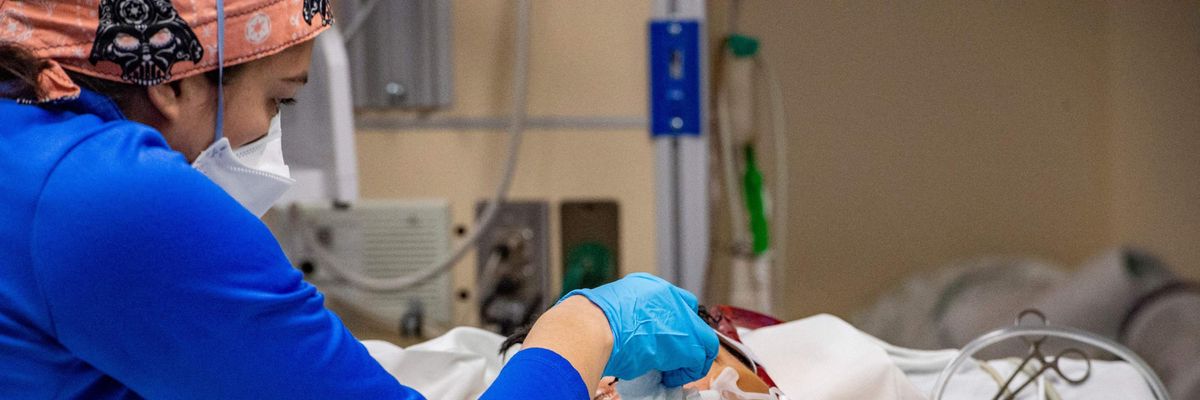New survey data released Monday shows just 12% of Americans think healthcare in the United States is handled "extremely" or "very" well, further evidence of the deep unpopularity of a profit-driven system that has left roughly 30 million without insurance coverage and contributed to the country's stunning decline in life expectancy.
"In the richest country in the world, no one should die or go into debt just because they don't have access to healthcare."
The new Associated Press/NORC Center for Public Affairs Research poll finds that 56% of the U.S. public believe healthcare in general is handled "not too well" or "not at all well," while 32% believe healthcare is handled "somewhat well."
In all, just 1 in 10 Americans feel the U.S. healthcare system as a whole and healthcare for older adults are handled well or extremely well.
"The poll reveals that public satisfaction with the U.S. healthcare system is remarkably low, with fewer than half of Americans saying it is generally handled well," AP notes. "The poll shows an overwhelming majority of Americans, nearly 8 in 10, say they are at least moderately concerned about getting access to quality healthcare when they need it."
The survey results will come as no surprise to those who have attempted to navigate the byzantine U.S. healthcare system to obtain basic care, which often comes at such prohibitively high costs that millions each year are forced to skip treatments to avoid financial ruin as insurance giants and pharmaceutical companies rake in huge profits.
The AP/NORC findings, based on interviews with 1,505 U.S. adults between July 28 and August 1, 2022, show that just 6% feel prescription drug costs are handled well or extremely well in the U.S., where pharmaceutical firms have broad authority to set prices as they please.
Related Content
Big Pharma Has Raised Drug Prices 1,186 Times This Year, Analysis Shows
Jake Johnson
As for potential solutions to the country's longstanding healthcare crises, the new poll shows that "about two-thirds of adults think it is the federal government's responsibility to make sure all Americans have healthcare coverage, with adults ages 18 to 49 more likely than those over 50 to hold that view."
"The percentage of people who believe healthcare coverage is a government responsibility has risen in recent years, ticking up from 57% in 2019 and 62% in 2017," AP notes.
More specifically, the survey shows 40% support for a "single-payer healthcare system that would require Americans to get their health insurance from a government plan." Depending on how the question is framed and phrased, single-payer--more commonly called Medicare for All--has polled as high as 70% support.
According to the AP-NORC survey, 58% "say they favor a government health insurance plan that anyone can purchase"--a public option.
Recent research shows that a Medicare for All system of the kind proposed in new legislation introduced by Sen. Bernie Sanders (I-Vt.) and Rep. Pramila Jayapal (D-Wash.) could have prevented hundreds of thousands of Covid-19 deaths in the U.S. over the past two years.
"In the richest country in the world, no one should die or go into debt just because they don't have access to healthcare," Jayapal, the chair of the Congressional Progressive Caucus, tweeted last week. "We need Medicare for All now."


